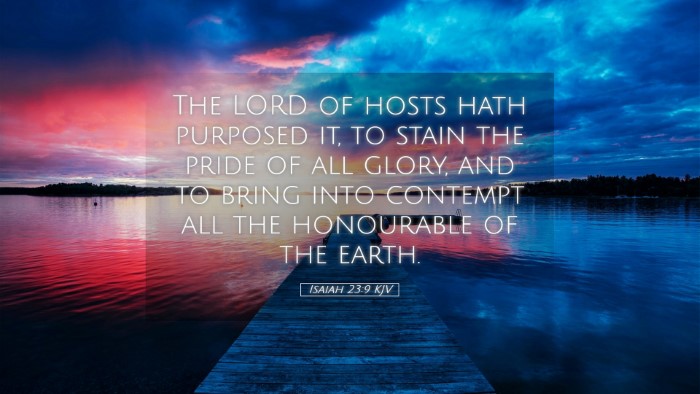Commentary on Isaiah 23:9
Bible Verse: "The LORD of hosts hath purposed it, to stain the pride of all glory, and to bring into contempt all the honorable of the earth."
Introduction
The passage from Isaiah 23:9 serves as a profound statement concerning God's sovereignty over nations, specifically regarding the fate of Tyre, a significant maritime and trading city of ancient times. The verse encapsulates a divine purpose aimed at undermining human pride and honor, a theme that reverberates through biblical narrative and theology.
The Sovereignty of God
Matthew Henry, in his commentary, emphasizes the Lord's absolute sovereignty over the nations. He notes that God has determined the downfall of Tyre, a city that epitomized wealth and pride. This serves as a reminder that no matter how mighty a nation appears, it is ultimately subject to divine governance.
- God's Purpose: The phrase "The LORD of hosts hath purposed it" highlights that the fall of Tyre is not accidental but part of God's intentional plan. God's purposes are both deliberate and aligned with His holiness.
- Staining Pride: The term "to stain the pride of all glory" suggests a divine action against human arrogance. The commentary correlates this with the broader biblical narrative where pride precedes a fall (Proverbs 16:18).
The Nature of Pride and Glory
Albert Barnes comments extensively on the idea that pride is one of the greatest obstacles to spiritual growth. In the context of Tyre, a city known for its wealth and splendor, God’s judgment serves to remind humanity of the transient nature of worldly glory.
- Transience of Glory: Tyre's glory is portrayed as fleeting; God's judgment brings it into "contempt." This invites believers to reflect on the lasting value of spiritual over material wealth.
- Collective Judgment: The focus on "all the honorable of the earth" indicates that pride is not restricted to one people or nation; it is a universal human condition that attracts divine scrutiny.
God's Contempt for Human Honor
Adam Clarke provides an insightful analysis of "to bring into contempt all the honorable of the earth." He interprets this as God's judgment extending beyond Tyre to all nations and individuals who place their trust in human strength and dignity.
- Divine Reversal: Clarke points out that God has a history of using the weak and despised to confound the wise (1 Corinthians 1:27). The exaltation of the humble is a recurring motif throughout Scripture.
- Call to Humility: Understanding God’s sovereign hand in societal structures should lead to personal and communal humility among believers. In the face of divine judgment, pride is rendered vain.
Practical Applications for Believers
In light of Isaiah 23:9, there are several practical applications that emerge for pastors, students, and theologians regarding pride and reliance on God.
- Reflect on Personal Pride: Believers are called to examine their own hearts for pride. Introspection is vital for spiritual growth, acknowledging that human accomplishments are fleeting without God’s grace.
- Encourage Others: Pastors should encourage their congregations to place their confidence in God rather than their own abilities or statuses, reflecting the truth that all has been made by Him.
- Integrate into Teaching: The themes from this verse can be integrated into sermons and theological discussions to foster a deeper understanding of God's power over the affairs of humanity.
- Pray for Humility: A prayerful spirit that seeks God’s guidance and recognizes His supremacy can cultivate a community that honors God above self.
Conclusion
Isaiah 23:9 stands as a powerful reminder of God's sovereign purpose in history and His disdain for human pride. The commentaries of Matthew Henry, Albert Barnes, and Adam Clarke collectively highlight the fragility of human honor when juxtaposed with God's eternal decree.
As believers, we are called to understand our place within the divine narrative, recognizing that our true value lies not in worldly acclaim but in our relationship with God. This verse not only serves as a warning but also as a profound invitation to embrace humility before the Almighty.


